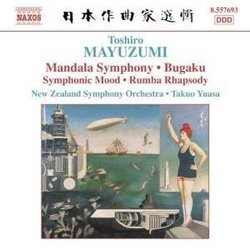| All Artists: Toshiro Mayuzumi, Takuo Yuasa, New Zealand Symphony Orchestra Title: Toshiro Mayuzumi: Mandala Symphony; Bugaku; Symphonic Mood; Rumba Rhapsody Members Wishing: 0 Total Copies: 0 Label: Naxos Original Release Date: 1/1/2005 Re-Release Date: 12/13/2005 Genre: Classical Styles: Historical Periods, Modern, 20th, & 21st Century, Symphonies Number of Discs: 1 SwapaCD Credits: 1 UPC: 747313269327 |
Search - Toshiro Mayuzumi, Takuo Yuasa, New Zealand Symphony Orchestra :: Toshiro Mayuzumi: Mandala Symphony; Bugaku; Symphonic Mood; Rumba Rhapsody
 | Toshiro Mayuzumi, Takuo Yuasa, New Zealand Symphony Orchestra Toshiro Mayuzumi: Mandala Symphony; Bugaku; Symphonic Mood; Rumba Rhapsody Genre: Classical
|
Larger Image |
CD Details |
CD Reviews"After silence, that which comes nearest to expressing the i Crazy Fox | Chicago, IL USA | 11/07/2009 (4 out of 5 stars) "In exploring the riches of Classical music, one starts of course with the giants like Mozart and Beethoven. That is well and good. However, with further exploration and the development of one's own particular taste, one eventually winds up poking about in the rather more esoteric and obscure nooks and crannies of music history, and when that time comes, Naxos is a key friend and guide. They excel at making otherwise hard-to-find music both accessible and affordable without sacrifice of quality, and this certainly goes for their ongoing series featuring Japanese classical composers as well, of which this CD is one. In a way, referring to Mayuzumi Toshiro (1929-1997) as "obscure" isn't quite fair, as he was a prominent and recognized composer during his lifetime, responsible for introducing the public to classical music for decades and even appearing in Suntory Beer ads on TV. Still, CD's of his work are almost as hard to come by in Japan as here in the States, making this collection of some of his earlier representative compositions a gem indeed.
"Symphonic Mood" (1950) is in fact Mayuzumi's first orchestral work and in many ways announces, acknowledges, and encapsulates the many musical influences on the young fledgling composer quite nicely if at times a bit too obviously. The swelling waves of Debussy fairly wash over one at the beginning, for instance--but one could certainly do worse for musical quotations. Less recognizable is Mayuzumi's debt to traditional Japanese music in "Bugaku: Ballet in Two Parts" (1962). Something of the strains of seventh-century Gagaku music can be detected but only after extremely careful listening, certainly not as overtly as in the compositions of Matsudaira Yoritsune (Matsudaira: Bugaku Dance Suite). Mayuzumi is neither the first nor the last Japanese classical composer to wrestle with the puzzle of combining Western and Japanese musical traditions in an artistically fruitful manner doing violence to neither; it may be that his approach is more subtle and internalized, or it may be that he missed the mark here. If the latter, well, the effort was still worth it. Another elaborate work evidencing Mayuzumi's then emerging interest in Japanese and pan-Asian culture (and this with apparently a bit of a neo-nationalist tinge growing out of his friendship and artistic collaboration with the novelist Mishima Yukio) is his "Mandala Symphony" of 1960. Inspired by the fantastically complex religious iconography of the Taizokai and Kongokai Mandalas within the Shingon school of Buddhism, this symphony presents the listener with music just about equally complex as Mayuzumi attempts to evoke with sound those deep and nearly ineffable spiritual truths which the Dual Mandalas are meant to evoke pictorially. This is a challenging piece, and bits of the first movement especially at first clashed upon my eardrums like Stravinsky in his rougher moods, and yet there is something deeply compelling about it that slowly unfolds over repeated playings. More accessible of course is "Rumba Rhapsody" (1948), an early and formerly neglected work of Mayuzumi's maturing apprenticeship of which this is the first actual performance, so there's something of note here even for any longtime Mayuzumi aficionados out there. Overall, this is a fine CD of sometimes daunting but ultimately rewarding music--esoteric in the best senses of the word." |

 Track Listings (7) - Disc #1
Track Listings (7) - Disc #1